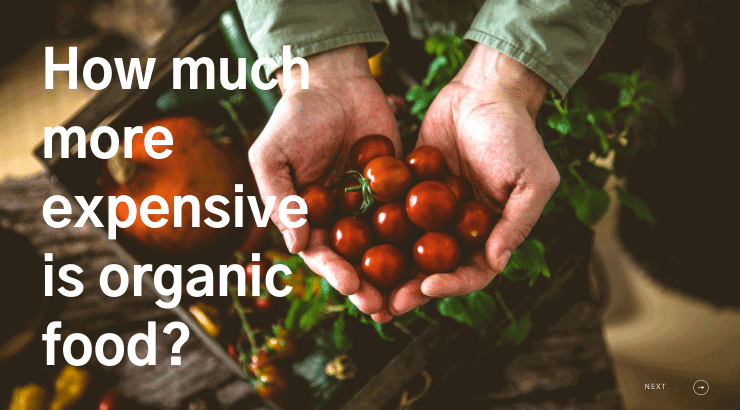Organic food is produce that is farmed without the use of pesticides and man-made fertilisers. Put simply, organic food is the most natural food you can buy. Research shows that organic food can be better for us (since it contains higher levels of certain nutrients), and organic farming better for the environment. The benefits of eating organic may go even further. One study has shown that individuals eating a diet of mostly organic food have a lower risk of developing cancer.
Whilst the appetite for organic food is on the rise (64% of British people purchased organic vegetables in an average month according to this 2017 study), with the UK market for organic food now worth £2.3bn, many people feel like they simply can’t afford to buy organic. So is the perception that buying organic groceries is far more expensive than non-organic food a myth, or is there truth in it?
Organic food is a lot more expensive than non-organic. Our analysis shows that a typical shopping basket (as per the CPI’s 2020 Basket of Goods and Services) of organic food costs more than double (105% more) the price of a basketful of the same, non-organic food items.
Details on our organic vs. non-organic food cost analysis
We took a cross-section of the various food categories listed in the CPI’s 2020 Basket of Goods and Services which totalled 29 typical food items. We took the prices of these organic and non-organic foods items from Sainsbury’s (the UK’s second-biggest supermarket chain) website on 13th March 2021. Sainbury’s was chosen because they offer one of the widest ranges of organic food. We attempted to match food items as closely as possible, opting for Sainsbury’s own brand foods where available, and paid close attention to weight, adjusting to match price per gram where necessary.
We note that our +105% figure is greater than the +89% difference cited elsewhere online, +89% appears to be an outdated statistic. For those that shop at cheaper supermarkets like Aldi or Lidl (both offering very few organic products), the difference between organic and non-organic grocery costs will be even more pronounced.
An organic diet is cheaper for vegetarians
We all know that meat is expensive but meat-eaters who prefer to buy organic compound their costs further. Our study shows that meat is the food category for which the price difference between organic and non-organic is starkest at 180%. Indeed, the food item where the organic premium is greatest sits in the meat category: a whole chicken, for which the price difference is a whopping 487%!
Why is organic food more expensive?
There are several reasons why organic food is more expensive than non-organic produce, including;
- the high costs of production for farmers
- supermarkets charging premium prices because organic is positioned as premium produce
- demand rising faster than supply supply
Source: Economicshelp.org
Will organic food get cheaper in the UK?
Marketwatch reported in 2019 that, in the US, organic food had started to get cheaper as it had become more mainstream. It’s not evident that the same thing has happened this side of the pond just yet. We can assume that supply will eventually catch up with the growing demand, and drive down the price of organic food in the UK. Furthermore, the new Environmental Land Management scheme that is replacing EU farming regulations in a post-Brexit Britain may make organic farming more attracted to British farmers.


